Monday, 8:09 a.m. Bloodshot eyes flicker open, and a student crosses the threshold between cold outside air and the musty scent of sleep-deprived high schoolers. Everyone else is already there, Chromebook hanging open. Some of their screens are open to Home Access Center, where 98s, 99s, and 100s populate an endless sea of boxes. Meanwhile, a discussion on how little sleep everyone received the night before is underway. Six hours. Three hours. An all-nighter. And in this community of dead eyes, too-bright screens, and early-morning air, everyone is working, and no one is alone.
This is burnout culture at Westwood High School.
Burnout culture is the normalization of overworking and constant stress in a school or workplace. At Westwood, burnout culture feeds on unrealistic workloads, ultra-competitive students, and the gradual acceptance of burnout for both students and staff. This detriments students’ self-esteem, giving rise to problems such as health issues and cheating. With college decision season in the past and end-of-course tests coming up, it is more important than ever to protect our school from the effects of burnout culture by analyzing the roots of these issues and exploring potential solutions.
When schools are known for their academic rigor and competition, students’ idea of a “good” grade begins to shift. Whereas most people consider a grade below a 70 to be failing, in these hypercompetitive environments, anything below a 95 can cause someone to spiral. These perceptions of grades come from an academic culture that encourages constant comparison. After a big exam in any Westwood class, the halls are filled with discussion of a possible curve, grieving the loss of a report card with straight As, and queries as to what the final problem was really asking. Once grades are posted, the first question people ask is, “What did you get on the test?”
Not only are grades and academics a big source of stress, balancing schoolwork with extracurriculars, clubs, and leadership positions also contributes to burnout, especially in high school. At Westwood, one student’s weekly after school schedule may include a host of activities such as attending the Chemistry Olympiad, presiding over Engineer Club’s general meeting, and rehearsing as the prestigious All-State violinist. One major impetus for participating in such a plethora of activities is college applications. A well-known sentiment among students is that they participate in certain things just to “put it on the resume” or so that they can so that they can tick off a box on the Common Application. Since many students believe that participating in as many extracurriculars as possible makes them the best candidate for prestigious colleges, they might engage with clubs or nonprofits for this reason alone.
By involving themselves in too many activities, students spread themselves thin, leaving less time and energy for each activity. Students that experience high levels of burnout in high school could have issues transitioning to college due to reduced motivation and well-being. Work-life balance is lacking in Westwood culture, which focuses on maximizing productivity above all else.
A culture of normalizing and encouraging serious sleep deprivation among teenagers is more than just a joke among students or the cost of “locking in” or becoming an “academic weapon.” Sleep deprivation is incredibly harmful, especially to teenagers, who are in a critical period of growth and development.
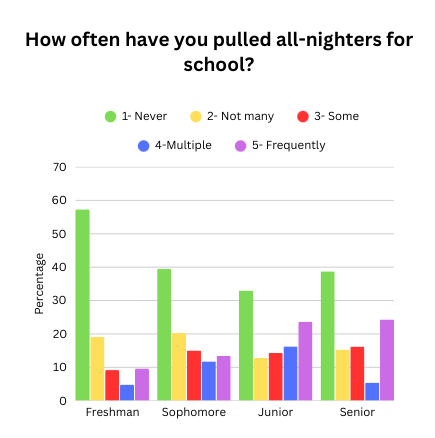
While the National Sleep Foundation states that teens need an average of 8-10 hours of sleep each night, a study by the CDC found that 73% of high school students sleep less than eight hours per night on weekdays, which has been shown to cause a myriad of problems among high school students. Westwood Student Press conducted a survey of the student body about their experience with burnout. Over the course of two days, the survey received 425 responses. 24% of Westwood juniors and seniors reported that they pull all-nighters frequently for school. More alarmingly, 43% of freshmen reported to have pulled an all-nighter before; 67% of juniors have done the same.
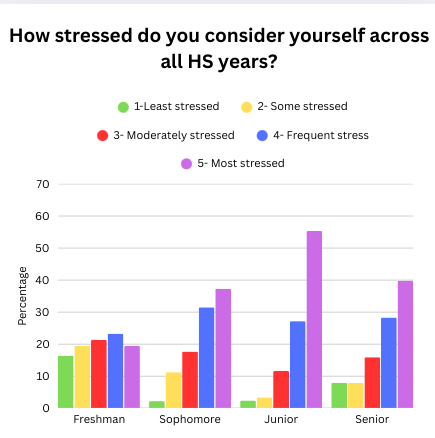
Large workloads and lack of sleep can also lead to burnout among teenagers. 55% of juniors rated their stress as five on a scale of 1-5. Juniors reported the highest stress of any grade level, with 19% of freshmen, 37% of sophomores, and 40% of seniors rating their stress as a five.
The normalization of sleep deprivation itself is counterproductive, as many teens sacrifice sleep to devote time to their studying, when getting less sleep decreases focus and brain function. A student’s teenage years are a critical time to develop and grow physically, emotionally, and socially. If teenagers can’t even meet a need as basic as sleep during school, then how are they going to have enough time or energy to grow into functioning adults? Schedules that depend on a lack of proper sleep and school-life balance are dysfunctional and harm students well into the future.
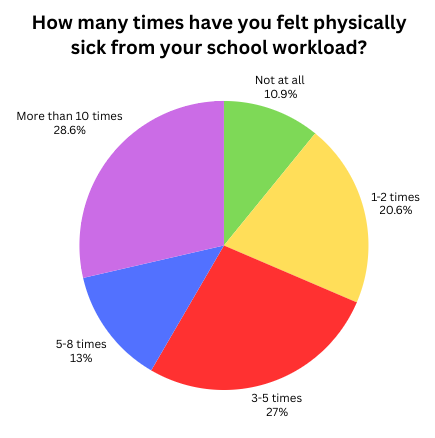
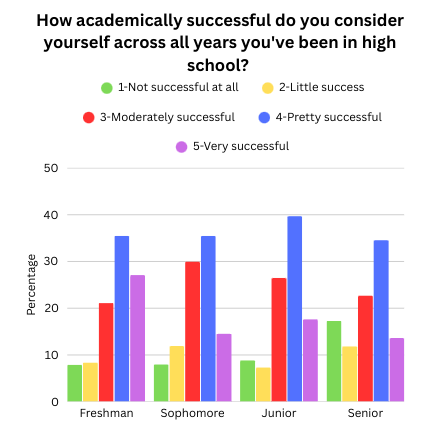
As students push their mental boundaries, teachers must adapt to the nuance of how to teach college-level material to tenacious students. And while the national issue of teacher shortages and budget cuts may seem insignificant, its real implications are apparent on the local level. Teachers are pushed to instruct additional courses, stripping them of valuable conference time and complicating their jobs as they quickly readjust between blocks.
Daily teacher life encompasses an abundance of on-the-spot adaptations to daily challenges, and students, caught up in the whims of their own academic anxiety, are quick to blame teachers as the bane of their high school lives. A simple expression of understanding goes a long way, but students blinded by their goals of academic success often lose sight of supporting the teachers that are there to serve them. In fact, part of early career teacher burnout on campus can be traced back to cutthroat students who exploit teachers’ novelty and their unfamiliarity with the system to claim greater knowledge of how the content and classroom should be organized.
Although these manipulations benefit students in the short-term by lightening their course load and easing harsh grading practices, the teachers on the receiving end are subject to constant confusion and bilateral pressure. Teacher burnout is not a product of carrying out duties listed in the job description — it is the implicit tasks borne out of unstable student-driven conditions that claw at teachers’ mental and physical boundaries. In the end, teachers are overworked and overstimulated from counteracting students’ obsessive ambition with their genuine efforts to emphasize the long-term benefits of learning over comparatively trivial indicators of success such as class rank or GPA.
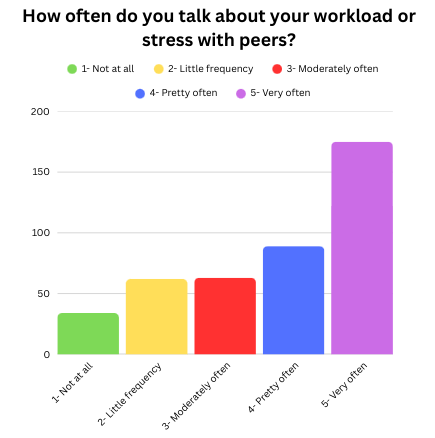
Despite our incessant complaints about workload or an overload of stress, the problem stems from the fact that we crave being busy — students have begun gravitating toward burnout and high-pressure environments like it’s a trend. We live in a society that equates busyness and stress with success. At a school as competitive — and even cutthroat — as Westwood, burnout culture is a rite of passage. Protests about the overwhelming amounts of AP World History notes or near-impossible math tests have become an expected part of the student experience and even a form of bonding, rather than a cry for help.
According to the survey, over 41% of students talk about the workload or stress from academics very frequently with their peers. We’ve fostered an environment centered around overworking and making stress our primary point of discussion.
To underclassmen, it’s almost a privilege to be powered solely on caffeine or to survive on two hours of sleep. But the truth is, that doesn’t have to be the norm. These toxic habits have mutated into an indicator of our work ethic and dedication to our academics, as though running on empty is somehow a badge of honor.
What we need is a culture shift — specifically, one that places more value on education and motivates students to learn for the sake of fulfillment, rather than anxiety over grades. If teachers decentralize grades from their curriculum by putting more emphasis on students’ progress, growth understanding, and engagement, students could absorb more knowledge and extract more meaning from their classes. This could look like decreasing the amount of graded busywork assigned in classes — if students aren’t worried about their grade, they might invest more into their learning out of interest; major assignments would reflect students’ overall understanding of the subject, as well as which students took advantage of this system to simply avoid work. Teachers could also implement more project based learning instead of simply just tests. A project over an entire unit gives students more time with the content and also ensures that students actually understand the content by forcing them to explain topics.
Projects could also prevent cheating, as students could be assigned different topics; even if a student gives information to another, it wouldn’t be just a simple letter choice. Students would still have to make the effort of gathering and explaining the correct information, making it much easier to detect academic dishonesty. Teachers can also provide more opportunities for students to give them regular feedback so they can understand the impact of their classes on students’ daily lives. The administration should get involved by limiting assigned homework to a reasonable extent to reduce the issue of multiple heavy assignments in each class combining to overload students’ schedules; teachers could log all major projects and assessments in a master spreadsheet to avoid overlapping assignments.
On a larger scale, colleges should adopt even more holistic approaches when reviewing applications, focusing on essays and contributions to school organizations. This would encourage students to place an emphasis on their learning as the end outcome of all their hard work, and focus on their understanding of their classes. Westwood can contribute to this as well by enforcing a stricter process of creating a club and ensuring that existing clubs are achieving their goals, decreasing some students’ ability to inflate their resumes with inauthentic activities.
Finally, the school should work harder to retain qualified teachers by increasing their salary. As leaders within their classrooms, teachers are crucial in shaping a productive learning environment for their students, and intense workloads affect them as well. Schools need to maintain experienced, hardworking teachers who can support each other in managing the difficult yet imperative task of educating a generation of incoming adults, and shaping the way they value knowledge.
Ultimately, it’s difficult to find concrete solutions to a problem that extends far beyond the walls of Westwood. Our school is just a microcosm of a larger cultural issue amongst students that pushes them toward unhealthy academic habits and burnout. Every year, college admissions cycles get more competitive, fostering the same level of competition on a smaller scale, and continuing toxic cycles that devalue learning. However, addressing the root causes of these issues is an important step towards shifting the cultural mindset to become more open to failure, and recenter school on learning to obtain knowledge, not the highest GPA.
After all, success for one person is not success for another. A number can’t fully quantify the effort students put in and the growth they have, and there shouldn’t be constant comparison that leads people to devalue their efforts because they seem to lead to diminishing returns. So much of the beauty of learning is the small discoveries made along the way as you make mistakes and find knowledge within them, not just what ends up on a report card. Students should not be striving for the impossible standard of perfection that the academic culture that Westwood consistently fosters. Instead, they should be encouraged to pursue their passions and grow into the best version of themselves. The decentralization of grades and GPA and emphasis on student growth and learning should be paramount over all else.














